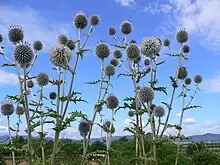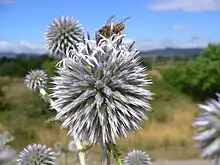| Echinops sphaerocephalus | |
|---|---|
 | |
| Scientific classification | |
| Kingdom: | Plantae |
| Clade: | Tracheophytes |
| Clade: | Angiosperms |
| Clade: | Eudicots |
| Clade: | Asterids |
| Order: | Asterales |
| Family: | Asteraceae |
| Genus: | Echinops |
| Species: | E. sphaerocephalus |
| Binomial name | |
| Echinops sphaerocephalus | |
| Synonyms[1] | |
|
Synonymy
| |
Echinops sphaerocephalus, known by the common names glandular globe-thistle,[2] great globe-thistle[3] or pale globe-thistle, is a Eurasian species of globe-thistle belonging to the tribe Cardueae within the family Asteraceae.
Description

Echinops sphaerocephalus is a glandular, woolly perennial herbaceous plant with an average height of 50–100 centimetres (20–39 in), occasionally reaching 200 cm (80 inches).[4]
Its erect branching, gray, slightly wrinkled and hairy stems bear the occasional large, soft, sharply toothed, sharp-lobed pointed green leaves. They are sticky hairy above, and white woolly below.[4]
Atop each stem is an almost perfectly spherical inflorescence up to 6 cm in diameter, packed with white or blue-gray disc florets. It flowers from June until September.[4][5]
The flowers are pollinated by insects (usually bees, wasps and butterflies) (entomogamy) and are hermaphrodite (self fertilization or autogamy). The fruits are hairy cylindrical achenes about 7 to 8 mm long. They ripen from September through October. The seeds are dispersed by wind (anemochory).[4]
Distribution
This species is widespread across much of Eurasia but it lives on other continents where it was introduced, including North America where it is a widespread weed.[4][6][3] It is very common in the mountains of southern France and southern and central Europe.[7]
Habitat
It grows in sunny, rocky or brushy places in more or less mineral rich soils at an altitude of 0–400 metres (0–1,312 ft) above sea level.
- Subspecies[1]
- Echinops sphaerocephalus subsp. albidus (Boiss. et Spruner) Kozu.
- Echinops sphaerocephalus subsp. sphaerocephalus
- Echinops sphaerocephalus subsp. taygeteus (Boiss. & Heldr.) Kožuharov
Gallery
 Illustration of Echinops sphaerocephalus from Flora von Deutschland, Österreich und der Schweiz, 1885
Illustration of Echinops sphaerocephalus from Flora von Deutschland, Österreich und der Schweiz, 1885 Close-up on flowers of Echinops sphaerocephalus
Close-up on flowers of Echinops sphaerocephalus Inflorescence of Echinops sphaerocephalus pollinated by a butterfly
Inflorescence of Echinops sphaerocephalus pollinated by a butterfly Leaf of Echinops sphaerocephalus
Leaf of Echinops sphaerocephalus
References
- 1 2 The Plant List, Echinops sphaerocephalus L.
- ↑ BSBI List 2007 (xls). Botanical Society of Britain and Ireland. Archived from the original (xls) on 2015-06-26. Retrieved 2014-10-17.
- 1 2 Flora of North America, Great globe-thistle, boulette commune, Echinops sphaerocephalus Linnaeus, Sp. Pl. 2: 814. 1753.
- 1 2 3 4 5 Flora of China, 蓝刺头 lan ci tou Echinops sphaerocephalus Linnaeus
- ↑ Rose, Francis (1981). The Wild Flower Key. Frederick Warne & Co. pp. 386–387. ISBN 0-7232-2419-6.
- ↑ Biota of North America Program 2014 county distribution map
- ↑ Altervista Flora Italiana, Cardo pallotta maggiore, drüsige Kugeldistel, bolltistel, Echinops sphaerocephalus L. includes photos and European distribution map
External links
 Media related to Echinops sphaerocephalus at Wikimedia Commons
Media related to Echinops sphaerocephalus at Wikimedia Commons Data related to Echinops sphaerocephalus at Wikispecies
Data related to Echinops sphaerocephalus at Wikispecies- ASTERACEAE, SUNFLOWER FAMILY, The Jepson Manual, University of California
- United States Department of Agriculture Plants Profile
- Globe Thistle, Ontario Weeds
- Echinops sphaerocephalus, alterVISTA
- Czech Botany